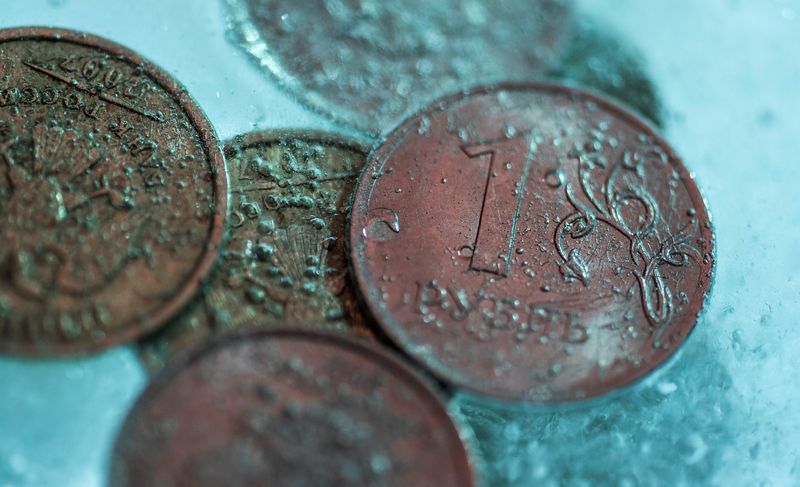By Darya Korsunskaya and Alexander Marrow
(Reuters) - As Russia's military spending soars and sanctions squeeze its energy revenues, Moscow faces a battle to keep its budget deficit in check, with few economists now expecting the finance ministry to stick to its promise of a deficit no higher than 2% of GDP.
Defence spending jumped 282% year-on-year in Jan-Feb alone, data showed this week, a shift that has kept Russia's industrial sector ticking along and spawned forecasts for economic growth this year.
Net exporter Russia typically posts budget surpluses, but its Jan-April budget deficit of almost $44 billion is already 17% higher than Russia's target for all of 2023, creating fiscal pressure as Moscow ploughs on with its military offensive in Ukraine.
On top of high spending, Moscow's energy revenue has slumped, down 52.3% year-on-year in Jan-April according to last week's data, with Russian oil and gas subject to Western sanctions and price caps.
Here are some of the ways Russia could wrest back control of its public finances and the challenges and potential obstacles it might face:
CUT SPENDING
On paper, the simplest way to reduce the deficit would be to cut spending.
Data showed that spending, which eased in February and March, was back above 3 trillion roubles in April, similar to January levels when the monthly deficit hit a record 1.76 trillion roubles.
Spending for the remainder of 2023 will need to be lower than in the same period of 2022 to meet Russia's overall 29.1-trillion-rouble ($363 billion) spending target.
That looks especially difficult as Jan-April expenditure has already hit 39% of the total, said Olga Belenkaya of Finam brokerage, who expects a deficit of at least 4-5 trillion roubles this year.
It is also hard to see where the cuts could come from. Defence spending shows no signs of abating, not least when Ukraine is preparing for a long-awaited counteroffensive, and social spending traditionally rises before presidential elections - the next one is just 10 months away.
Furthermore, hefty spending is Russia's main economic growth driver.
"Current optimism in the economy is to a significant degree linked with the state actively spending resources, including on defence," said Dmitry Polevoy, head of investment at Locko-Invest.
"The economy, in our view, is now like a bodybuilder on steroids. Once these steroids are exhausted, it will be far harder for the economy to show growth."
INCREASE DOMESTIC BORROWING
International markets are largely closed to the Russian sovereign, and some have urged Moscow to be braver with domestic borrowing to make up that shortfall.
Oleg Shibanov, a professor at the Russian Higher School of Economics, said that there is room to manoeuvre.
"We have very low government debt and from this point of view, expanding the OFZ (treasury bond) market could live on many more years," said Shibanov.
But CentroCredit economist Evgeny Suvorov said borrowing rates above 10% for long-term financing were too high.
"The main restriction for rapid debt accumulation is its high cost due to persistent uncertainty and extremely high risks," Suvorov said.
RAISE TAXES
"If you are a conservative finance ministry and don't want to borrow much and expensively, then you look for other options," said Renaissance Capital's Sofya Donets. "You can cut other (except for defence) spending if you don't have an electoral cycle, which we do.
"So that leaves the third option - raising taxes."
Russia's government has already announced plans to levy a one-off windfall tax on corporate profits, but other tax rises could follow.
Shibanov expects the tax burden on wealthy Russians to increase first.
"Some of the taxes that will be introduced will likely look like taxes of 'social fairness'," Shibanov said, anticipating experiments with income tax changes to continue.
TAP THE RAINY DAY FUND
The finance ministry spent almost 3 trillion roubles covering last year's deficit from its National Wealth Fund (NWF), which accumulates surplus oil and gas revenues.
The finance ministry has spent 400 billion roubles this year and by law can spend up to 2.9 trillion roubles. By 2024, the finance ministry forecasts available NWF funds could drop to just 1.4% of GDP, the lowest level in 20 years.
Evgeny Kogan, professor at Russia's Higher School of Economics, forecast a year-end deficit of 6 trillion roubles, or 3.9% of GDP, naming domestic borrowing and NWF funds as the way to finance the deficit.

"It is unpleasant, but not tragic," he said.
($1 = 80.0700 roubles)